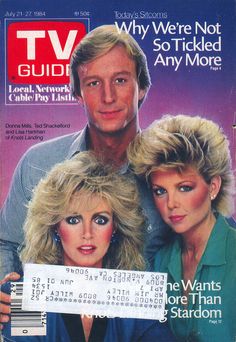TV Guide, Canada, July 21, 1984
Two o’clock on an unusually humid afternoon in Los Angeles, a city that does not wear discomfort well, and on Stage 4 of the MGM lot everyone is a little irritable. A couple of crew members are desultorily lobbing paper balls at each other while Lisa Hartman looks on blankly “Damn, it is hot around here,” says one technician. “Is it hot to you, Lisa?”
Hartman does not hear him. She is steeling herself for another scene in CBS’s Knots Landing, in which she will have to cry and tell a spurned lover how sorry she feels to have ruined his marriage, his life, his manhood. “If you can’t cry, they spray this stuff in you eyes and you do,” she says, shrugging , a trifle bored.
“You know, They shot ‘The Wizard of Oz’ right here,” a production assistant announces, trying to brighten everyone’s mood, and a few sets of eyes scan the rafters, where they used to hang the old lights. There is no feeling of ghosts here, no way to imagine Judy Garland traipsing along with the Scarecrow and Tim Woodman, and so, after a while, all eyes return to the stage. Sitting in a musty director’s chair, Hartman continues mumbling lines to herself. The old chair, the grumbling crew, this studio where they once shot ‘Oz’ and which has since undergone numerous face lifts-all of it seems to represent the gulf between what Hollywood promises the innocent and what, in the end, it delivers.
Eventually, however, everyone learns the truth. Judy Garland did, and lately, so, too, has Lisa Hartman. “It’s a business,” she says. “You learn that in a hurry. When they start seeing you in a certain way, that’s it. I got my hair cut for the role. I became a big deal. I started lifting weights, started developing my body. That became a big deal too. We don’t want to become Amazons. That seemed to be the attitude. I’m being careful about it, now, nut still, they….” Her voice trails off.
They seem to be, at various times, producers, directors, network executives, even fans. “I know that they mean well, but sometimes it can be such an intrusion, and you just don’t know what to say,” she explains. “I mean the questions. They are just these weird things that they say, like ‘you got your hair cut.’ What am I supposed to say to that? “Uh, yeah, I did. It’s strange…..”
It is not what she had in mind when she came to Hollywood. God, she wanted to be a singer, she tells you. She is ready to launch into another story about this very weird girl who asked her about her hair outside a Hollywood rock club when the assistant director shouts that it is time to do a take. Hartman rises, “Part of it is probably me,2 she says. 2I don’t like people always doing or saying the same things. I don’t like my self doing the same old things. I get bored easily. Always have.”
As a child, she spent much of her time in nightclubs. She went to watch her father, a handsome nightclub singer with a dreamy voice, and she always studied the crowds, trying to read their faces, fascinated at the way the women in the small lounges looked at her father so longingly. Even then, she loved the stage, wondered what it would feel like to be up there, to be the focus of all that adoration. That entertainers were nomads and Hartman found herself in strange new cities every couple of years did not bother her, for she cared only about the stage and the next gig down the road. “I liked change,” she declares later. “I’ve always liked change. I need change. I like new places, new hotels. I guess you could describe me as restless….”
She says this while sitting in front of a makeup mirror and wiping tears from her electric-blue eyes, the tear-jerking scene behind her. ‘Just great Lisa,’ the director had shouted to her at the end of the take, and then director turned to a crew member. ‘Absolutely believable,’ the director beamed. Hartman said nothing. She returned to her dressing room on the MGM lot, this little trailer decorated in earl Las Vegas, with a zebra rug and zebra walls and the kind of bright-red couch that you see in casing lobbies.
Now she is studying her blonde hair, short and vaguely punk, and pronounces herself tired of it. “I can feel another change coming soon,” she sighs. She could never stay satisfied with a particular look for very long, she says ruefully. “What is that?” she asks in the next breath. She shakes her head, not quite sure, and then remembers why her listener has come. “You want to talk about the show,” she laughs, wiping away a final tear. “Well. let me tell you this: it has a high amount of realistic restlessness.”
To believe that a soap, any soap, has a ‘high amount of realistic restlessness,’ maybe it helps to feel restless yourself, to believe that life is a volatile proposition, just as in Knots Landing. For this is a show where all the characters are restless, where a man (Gary) impregnated his former wife (Val), then quickly married his mistress (Abby), who soon began having an affair with a rising politician. This is a show where three women battled one another for the affections of an amorous alcoholic. This is a show where the last honorable woman was exposed as a pill freak. ‘Small Town, U.S.A.,’ a publicist for Lorimar Studios calls it. It was Small Town U.S.A, that Lisa Hartman entered in 1982 as Ciji, a lounge singer who became involved with Gary, only to be murdered be Chip, her manager, and lover, before he ran off with another girl.
That’s the way it was in Knots Landing: death and destruction were always just around the corner. With Ciji’s demise, Hartman was out of a show. In the aftermath, however, Knots’ producers realized that Hartman’s impact on the show had been significant. “We got a great response from the Ciji character,” remembers the show’s producer, David Jacob’s. “In the script, we had described Ciji as an ‘Angel-slut’ Well, Lisa wasn’t slutty, but she looked like she was off the streets …… kind of sexy, and not too gorgeous. She wasn’t glamorous, but she had this quality ……. Audiences loved her”
She could do everything, says Jacobs. She could even sing, and the producers had lifted a track off Hartman’s new pop album and made it the theme song for one of the episodes. Jacobs told his associated that he wants Hartman back on the show. Knots Landing had always taken liberties with plots, bit one thing it couldn’t do was resurrect a dead lounge singer, so the show’s writer and producers began thinking of a new character. “We were in a rush,” recalls Jacobs, “because ABC wanted her. We didn’t want to lose her, because she brought to the show a youth quality that we needed. It was something we hadn’t had before Lisa”.
“I was told about the new character,” recalls Hartman. “Her name was to be Cathy, and she was going to be this innocent girl who eventually meets this millionaire [Gary] and thinks about taking up a singing career, just like Ciji. But she’s not a bitch like Ciji. She’s much more streetwise-and very vulnerable. . . . I could see I’d look like a fool if she looked like some double of Ciji. So I had to look a lot different.”
She cut her hair, something she had wanted to do anyway, gained some pounds and injected some naiveté into her character. The metamorphosis complete, she began shooting during the series seventh episode and, soon after, signed a two-year contract for the show. “The new character is fantastic,” says Jacobs. “You can see the climb in our ratings since Lisa has been with us. I’m not saying she’s the only reason . . . . . but she is a big part of it.”
The show trounced its chief rival, Hill Street Blues, last season, and so the powers-that-be–Jacobs, Lorimar, CBS– are pleased. “Lisa Hartman,” says a spokesman for the network , “is a pistol.2
Now the pistol sits in a Beverly Hills restaurant, pushing away her food talking not about the show, but of other projects, other deals. “I just finished doing a remake of ‘Where the boys are’,” she says. “It’s a feature, a musical. We’re looping some of it tonight.”
Which means that she’ll be singing the movie’s title song. She smiles now, a girlish grin, the first time she has looked excited about anything all afternoon. “More than anything, I want to sing and do a big record,” -she says intensely. “I have to do it.”
Singing provided her with a start in entertainment. At 16, she was a lead singer in a Houston rock band called “Lisa Hartman and Four Grand,” dealt with promoters, wrote the band’s checks, talked to agents. Full of hope at 19, she came to Los Angeles, recording a 1976 album for CBS Records that quickly went nowhere. Welcome to Paradise. “They didn?t promote the album very well,” recalls Hartman. “I’ve cut two albums since, so I’ve learned some things about the business. There is snobbery in it. lot of stations won’t play your records.”
She frowns. “You have to hang in there,”she says. “I think I’d like to be the female equivalent of Rick Springfield. To go from General Hospital to [Win a Grammy] is unbelievable. If you find that hit record, they have to play it. That’s what I’m doing: looking to record that big one . . . but I still remember those times, after the first album, when no one would play a song. I’m determined to make it. I will make it”
Her voice has a risen, and a nearby waitress turns to look at her, studying Hartman’s face, knowing that she has seen it somewhere. The waitress is pretty, tall, and blonde: she could be an aspiring actress herself; and now she appears to be scrutinizing Hartman, looking for an attractive quirk, something she can use, too. Hartman plays with her food. It is hard to tell whether she notices the waitress. “It can be a very hard town,” she says simply.
After the Failure of her first album, she looked for roles in television shows, cameras not being alien things to her. As a child, she had modeled and performed in commercials, once joining John Wayne in a public-service announcement for tuberculosis and so she felt an ease before the television eye that few neophyte actresses enjoyed. She got a part in a Police Woman episode, and then won the starring role in the ill-fated Tabitha, a spin-off of the hit series Bewitched. “Tabitha didn’t have the greatest of luck,” she says. “Jiggles were in that year, but Tabitha couldn’t jiggle. She wore a turtleneck and a bra until the network people got a look at a few tapes. They called the wardrobe people and said, “Tabitha has to jiggle. Lose the bra.”
After Tabitha followed another album and scattered guest roles on a potpourri of television series, including Fantasy Island and The Love Boat. In the next couple of years, she had major parts in a string of television movies, most notably portraying a restless housewife in “Where the Ladies Go,” in which she co-starred with Earl Holliman. Her big break came when she portrayed rock star strung on drugs in CBS’s remake of “Valley of the Dolls.” In 1982 came the chance to star in Knots Landing, and no one, not even Hartman, could envision how much Ciji would stir viewers. “I think Lisa was very responsible for the development of Ciji,” says co-star Ted Shackelford. “She has great instincts, not a lot of actor technique, just great instincts. She doesn’t like o rehearse a lot. She like to think about it and them do it, so she’s fresh. Above all, she is a very hard worker, very concerned about her work.”
Maybe too concerned at times. “She worries a lot about her character”, says producer David Jacobs. “She worries about where it’s going, if a scene is tight– Typical concerns for an actress. Maybe she worries more than most. She requires a little bit of hand holding”.
“I like things to be just right,” she admits. “I want to keep getting better, keep moving ahead.” After Ciji’s death, while Lorimar officials agonized over how to bring her back, Hartman quietly signed to do the ABC series High Performance. The series only lasted four episodes, and soon afterward, Hartman was back at Knots, the recipient of a lucrative new contract, but still seemingly restless, wondering what lay ahead.
Her engine never idles. In this Beverly Hills restaurant, where tastes run toward Mercedes convertibles and Gucci hand-bags, she spends a full 20 minutes one afternoon talking about the finer points of auto thrill shows. “You know those guys who tilt their cars and go on just two wheels of a ramp?” she beams. “I’d like to try doing that. I could . . .” And she smiles then, relishing the dream.
The waitress steals a last glance. Hartman sips her drink and studies her nails, lost in thought. The dreams, the hobbies, the diversions, they are her only escapes from the business of making TV shows, for she is not, in her words, ‘A party girl,’ not enamored of ‘Hollywood things,’ and no longer the girl friend of actor Barry Bostwick, with whom she split up earlier this year. She has her work and she lives quietly in Los Angeles, and yet it is far from enough. What will only make it complete is standing under the hot white lights of a big stage. “I want to sing,” she says. “That is my goal” Deep in that part of her that is still the little girl watching her baritone father, singing is what she has always wanted.
“I can do it,” she says, excited. “I came out here with a dream and I still want to see it happen.”







